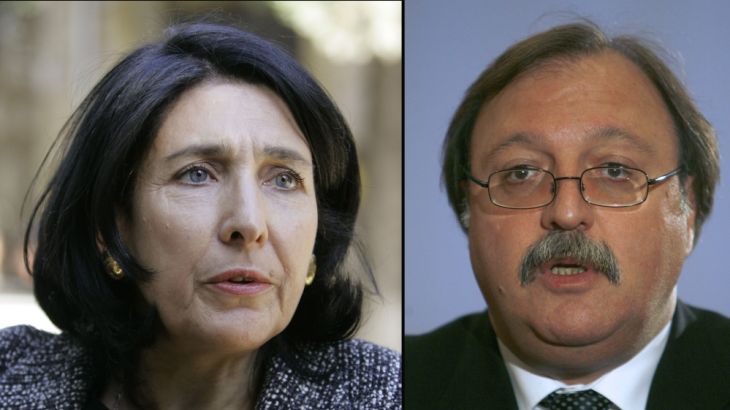Georgia votes in ‘high-stakes’ presidential runoff
Final round pits two former foreign ministers against each in a vote seen as key test for ruling Georgian Dream party.

Georgians are voting to pick their next president in a tight election runoff after an inconclusive first round last month which left the ruling party in disarray.
Polls opened across the former Soviet nation at 8am local time (04:00 GMT) on Wednesday and voting is due to last until 8pm (16:00 GMT).
Keep reading
list of 4 itemsCroatians vote in election pitting the PM against the country’s president
Solomon Islanders vote in election that could shape ties with China
Analysis: Ruling party errors give Turkey’s opposition hope for future
The second round pits two former foreign ministers against each other after French-born Salome Zurabishvili, an independent candidate backed by the ruling Georgian Dream party, failed to win more than 50 percent of the vote on October 28.
Zurabishvili, Georgia’s foreign minister from 2004-2005, received 38.6 percent of the vote in the first round, ahead by just one percentage point of the opposition challenger Grigol Vashadze.
The election is seen as a crucial test for the increasingly unpopular Georgian Dream party and will be the last in which the president is selected by popular vote.
In the future, presidents will be picked by an electoral college of 300 legislators and regional officials, as the country of nearly 4 million people transitions to a parliamentary republic.
Constitutional changes have also reduced the authority of the president, and put most levers of power in the hands of the prime minister, a Georgian Dream loyalist.
Western ties in focus
International observers said that the first round of voting had been competitive, but had been held on “an uneven playing field” with state resources misused, private media biased, and some phoney candidates taking part.
The first round result was a setback for Georgian Dream which is led and funded by billionaire Bidzina Ivanishvili who made his fortune in Russia.
Observers see Wednesday’s poll as a key test for the ruling party before the parliamentary elections in 2020.
|
|
“For Georgian Dream, the stakes are especially high and it struggles very much … to win in the second round,” Gia Nodia, the founder of the Caucasus Institute for Peace, Democracy and Development, an independent think-tank, told the Associated Press news agency.
If elected, Zurabishvili, 66, a former French career diplomat, would be the first female leader of not only Georgia but any former Soviet state outside the Baltics.
She favours a policy balancing Georgia’s aspirations to move closer to the West with a desire to avoid antagonising the Kremlin.
But Zurabishvili’s opponents, who cast her as a pro-Russia candidate, have criticised her for statements that appeared to blame Georgia for the war with Russia in 2008 and remarks about minorities that some see as xenophobic.
If the opposition challenger Vashadze wins, he is likely to use the presidency’s limited powers to push a vocal message of integration with the US-led NATO alliance and the European Union.
The opposition said there have been attacks on opposition activists during campaigning. One opposition coordinator was stabbed and a petrol bomb was thrown into the yard of another activist.
The ruling party has denied any link to attacks on opposition activists, and refuted it attempted to unfairly influence the outcome of the vote.